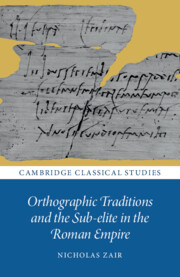The diphthong /ɔu/ became /oː/ and then /uː/ by the third century BC (see pp. 39–40). On the use of <o> in place of <u> in poplicos > pūblicus and words derived from it, see Chapter 17. It is possible that iodicauerunt (Kropp 11.1.1/26) in a curse tablet from Carthage, in the second century AD, for iūdicāuē̆runt < *i̯oudik- is an old-fashioned spelling representing the mid-point of the change (at any rate, no other explanation springs to mind). Since we have long /uː/ in the first syllable, this spelling cannot be explained by confusion of /ɔː/ and /u/. At least in legal texts, derivatives of iūs were particularly favoured for this (Reference DecorteDecorte 2015: 160–2), although use of <o> for /uː/ rather than <ou> was never common, even in the archaic period.

